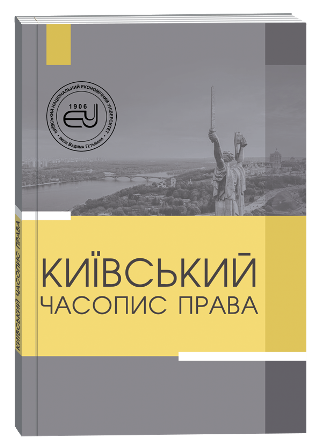CONSTITUTIONAL COMPLAINT INSTITUTE: FROM IDEA TO NORM
DOI:
https://doi.org/10.32782/klj/2022.2.4Keywords:
constitutional control, constitutional complaint, constitutional act, democracy, human rightsAbstract
The emergence of the idea of a constitutional complaint and its further introduction into the legal field determined a new stage in the development of constitutional control as a whole. The involvement of a person in the process of constitutional control, on the one hand, strengthens democracy, and on the other hand, it directly protects the constitutional rights of a person. This mechanism of individual constitutional appeal of a person to the body of constitutional control became widely spread in Europe after the Second World War. Most European countries take into account the experience of introducing a constitutional complaint in other countries and adapt it to their national legal systems. However, the effective implementation of a constitutional complaint is impossible without an understanding of the meaning underlying the idea of an individual constitutional appeal. The article analyzes the genesis of the institution of a constitutional complaint in the mechanism of constitutional control from the birth of an idea to its normative consolidation. Retrospective analysis made it possible to single out the periods of the individual's protection of his constitutional rights, as well as the content and nature of the relationship between the individual and the state. The legal nature of such a mechanism of constitutional control primarily provided for the protection of constitutional rights as such, however, the consolidation of international human rights determined the process of adapting national legislation to international legal norms, as one of the main requirements of the transition to democracy. What is special is that in such relationships a person acquires the right to oppose the state, which changes the approach to the very ideas of both democracy (due to the direct participation of the person in the process of rule-making) and the state (from a power system to a people-centered one). The legal nature of the constitutional complaint, depending on which of the mentioned approaches is a priority, can be considered as a «human rights», «law-forming» or «state-forming» institution, and therefore implemented, according to the chosen model.
References
Кельзен Г. Про сутність і цінність демократії / Ганс Кельзен ; з нім. пер. Олександр Мокровольський. – [Львів] : ВНТЛ-Класика, 2013. 139 с.
Dejan Saveski: Constitutional appeal – procedure institute for human rights protection Zbornik radova Pravnog fakulteta u Splitu, god. 55, 3/2018., str. 625. – 638.
Сліденко І. Д. Феноменологія конституційного контролю. Генеза, природа і позиціонування в контексті аксіологічних, епістомологічних, праксіологічних, синергетичних аспектів: Монографія. К.: Істина, 2010. 624 с.
Малишев Б. В. Принцип панування права (The rule of law) у праці Альберта Дайсі «Вступ до вивчення конституційного права». URL: http://dspace.nbuv.gov.ua/bitstream/handle/123456789/13646/14-Malyshev.pdf?sequence=1
Marbury v. Madison, 5 U.S. 1 Cranch 137 (1803). URL: https://supreme.justia.com/cases/federal/us/5/137/
Bavarian Constitution, 1818. URL: https://www.constituteproject.org/constitution/Bavaria_1808?lang=en
Constitutional Act of the Grand Duchy of Baden, 1818. URL: https://www.constituteproject.org/constitution/Baden_1818?lang=en
Сonstitution of Austria, 1920. URL: https://www.constituteproject.org/constitution/Austria_2013?lang=en
Gottfried Dietze, Judicial Review in Europe, 55 MICH. L. REV. 539 (1957). URL: https://repository.law.umich.edu/cgi/viewcontent.cgi?params=/context/mlr/article/7171/&path_info=
Henkin L. Constitutional Rights and Human Rights. Harvard Civil Rights-Civil Liberties Law Review. 1978. Vol 13. P. 595, 596, 599
Study on individual access to constitutional justice – Adopted by the Venice Commission at its 85th Plenary Session, CDL-AD(2010)039rev-e (Venice, 17-18 December 2010). URL: https://www.venice.coe.int/webforms/documents/?pdf=CDL-AD(2010)039rev-e
Бичков І.Г. Кельзенівська модель конституційної юрисдикції як теоретична основа європейської системи конституційного правосуддя. Часопис Київського університету права (2020/1). URL: https://www.researchgate.net/publication/342355347_Casopis_Kiivskogo_universitetu_prava
Trevor L. Brown & Charles R. Wise, “Constitutional Courts and Legislative-Executive Relations: The Case of Ukraine”, Political Science Quarterly, Vol. 119, No. 1, 1994, p. 155.
Germany (Federal Constitutional Court), Luth Case, BVerfGE 7, 198, 1 BvR 400/51, English translation in (1998) Decisions of the Bundesverfassungsgericht – Federal Constitutional Court – Federal Republic of Germany, vol. 2/Part 1, Baden-Baden: Nomos Verlagsggesellschaft.







